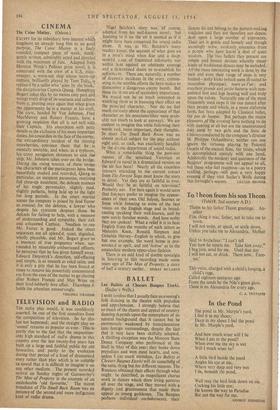TELEVISION and RADIO
THE radio play would, it was confidently asserted, be one of the first casualties from
the competition of television. So far this has not happened; and the straight play on 'sound' remains as popular as ever. This is
partly due to the fact that the unquestion- ably high standard of radio drama in this country over the last twenty-five years has built, up a large and faithful public for old favourites, and partly to the evolution during that period of a kind of dramatised story rather than play which is so suitable to sound that it is difficult to imagine it on any other medium. The present recorded revival on Sunday nights of Galsworthy's The Man of Property is the example of an unshakeable 'old favourite.' The recent broadcast of The Small Back Room was an instance of the second and more indigenous kind of radio drama. Nigel Balchin's story was, of course, adapted from his well-known novel; but listening to it on the air it seemed as if it might have been conceived for sound radio alone. It was, as Mr. Balchin's many readers know, the account of what goes on in a man's mind when fear and a deep- centred !line of frustrated inferiority war within h m against an obstinate courage and a determined desire to rc-establish his self-esteem.. There are, naturally, a number of dramatic incidents in the story, culmin- ating in the terrible efforts the hero makes to dismember a dangerous enemy bomb. But these incidents are of secondary importance. We would not be so much interested in watching them as in knowing their effect on the prinepal character. Nor do we feel much curiosity about the appearance of that character or his associates (they were prob- ably not much to look at anyway). We are content to imagine this while following their words and, more important, their thoughts. In short The Small Back Room was an almost perfect subject for the play without sight and, as such, was excellently handled by the drama department of sound radio.
What a remarkable thing the post-war success of the serialised Victorian or Edwardian novel in a dramatised version on the air has been! Nearly all the countless listeners attending to the current extract from The Forsyte Saga must know the story in detail. Yet they arc as faithful as ever. Would they be as faithful on television? Probably not. For here again it would seem that list( ncrs prefer to imagine the appear- ances of their own Old Jolyon, Soames or Irene while listening to some of the best voices on the English stage and in broad- casting speaking their well-known, and by now surely familiar words. And how nobly they are spoken! What a relief it is to hear English from the mouths of such actors as Malcolm Keen, Ronald Simpson and Griselda Hervey—English in which, to give but one example, the word home is pro- nounced as spelt, and not 'Frame' as in the emasculate modern upper-class fashion.
There is an odd kind of double nostalgia in listening to this recording made some years ago of The Man of Properly, a story of half a century earlier. MORAY MCLAREN


































 Previous page
Previous page